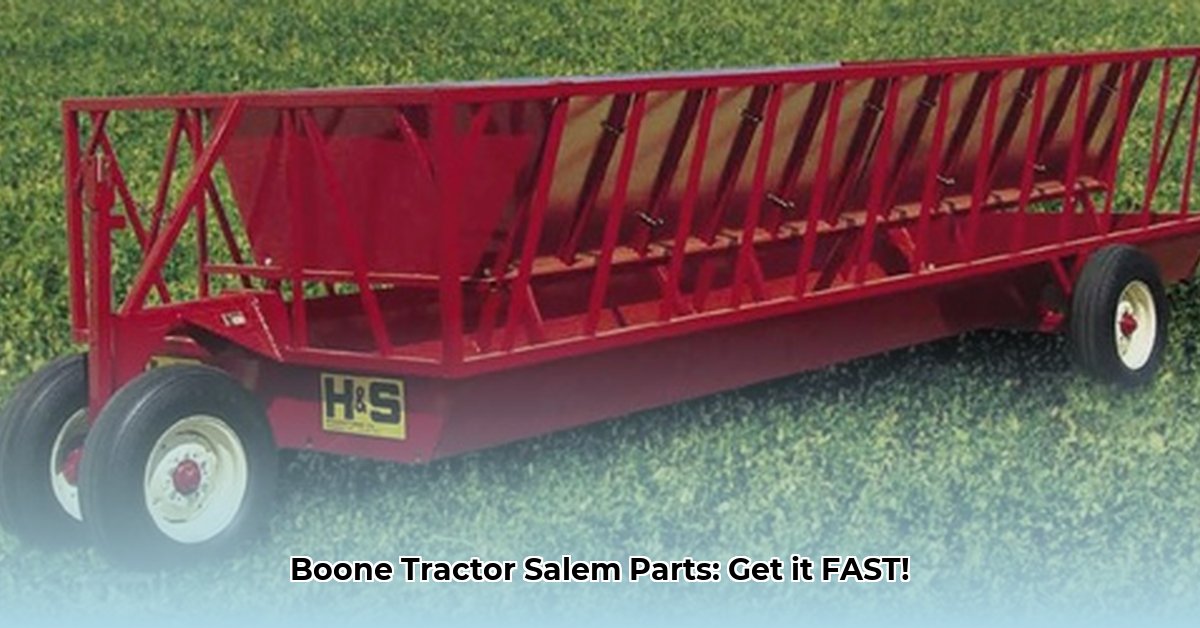
Boone Tractor Salem's Online Parts Sales: A Deep Dive into Service and Scalability
Boone Tractor Salem offers a unique approach to online parts sales, prioritizing personalized service over speed and scale. This strategy, while effective in building customer loyalty and reducing errors, presents challenges in terms of efficiency and reach. This article examines the strengths and weaknesses of their model, exploring its implications for both the business and its customers. For alternative tractor parts suppliers, check out this resource.
The Personal Touch: A Differentiated Approach to Parts Ordering
Unlike many online retailers, Boone Tractor Salem emphasizes human interaction. Each order involves a conversation with a knowledgeable staff member, ensuring the correct parts are identified and ordered. This personalized approach minimizes errors, leading to higher customer satisfaction and reduced returns. However, this process can be slower than automated systems, potentially delaying order fulfillment. A customer might wait longer, but they gain the assurance of expert guidance. Is this trade-off worthwhile? That depends entirely on the customer's priorities. For complex orders or customers unfamiliar with tractor parts, this personalized approach is invaluable.
Return Policy: Transparency and Limitations
Boone Tractor Salem's return policy includes a 25% restocking fee and specific conditions on item condition. While this policy protects the business, it can be restrictive for customers. Their clearly defined list of non-returnable items adds to the transparency, but also underscores the importance of careful consideration before purchasing. Customers should review the details meticulously, as the process isn't as simple as many other online retail experiences. The high restocking fee reflects the commitment to personalized service and the associated investment in accurate part selection.
Scalability and Limitations: The Bottlenecks of Personalized Service
Boone Tractor Salem's commitment to personalized service inherently limits scalability. Their reliance on manual order verification and external suppliers creates potential bottlenecks, impacting shipping times and inventory availability. International shipping is not currently an option, and same-day delivery isn't guaranteed. Their current model faces limitations when dealing with high order volume, highlighting a core tension between personalized service and efficient fulfillment. What are the implications of this limited scalability for future growth? Only time will tell.
The "Parts with Service" Model: A Niche Strategy with Trade-offs
Boone Tractor Salem's strategy centers around a "Parts with Service" model, differentiating them from purely transactional online retailers. This approach, while building loyalty, increases operational costs and limits scalability compared to larger competitors. The question remains: Can this niche strategy sustain itself in a competitive landscape dominated by automated, high-volume retailers? Their success hinges on maintaining a strong customer base that consistently values this personalized approach.
Growth Opportunities and Potential Pitfalls: Navigating the Future
Boone Tractor Salem needs to address several areas for continued success. Streamlining internal processes, exploring inventory management software, and refining their return policy could yield short-term gains. Long-term, investing in a robust e-commerce platform and exploring third-party logistics (3PL) providers for shipping are essential. This combination of immediate improvements and long-term strategic investments is critical for maintaining a competitive edge.
Key Takeaways:
- Personalized Service: Boone Tractor emphasizes human interaction, leading to higher accuracy but slower processing times.
- Return Policy: A strict return policy with significant restocking fees reflects a focus on accuracy and minimizing losses.
- Scalability Challenges: The personalized approach, while effective, limits the company's ability to scale operations and handle large order volumes.
Navigating the Risks: A Proactive Approach
Boone Tractor Salem faces several risks, including vendor stockouts, shipping delays, and negative customer reviews. Proactive mitigation strategies are essential. Diversifying suppliers, improving inventory management, enhancing communication with customers, and addressing complaints swiftly are key to minimizing these risks. Furthermore, maintaining regulatory compliance is paramount to avoid significant penalties. The company must carefully balance its unique service model with the need for efficient operations and risk management.
Boone Tractor Salem's future success depends on striking a balance between its personalized service and the need for greater efficiency and scalability. This requires a careful consideration of its operational model and commitment to adapting to a dynamic market.